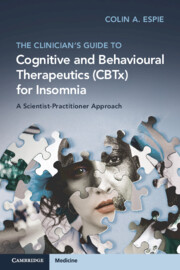 The Clinician's Guide to Cognitive and Behavioural Therapeutics (CBTx) for Insomnia
The Clinician's Guide to Cognitive and Behavioural Therapeutics (CBTx) for Insomnia Book contents
- The Clinician’s Guide to Cognitive and Behavioural Therapeutics (CBTx) for Insomnia
- Reviews
- The Clinician’s Guide to Cognitive and Behavioural Therapeutics (CBTx) for Insomnia
- Copyright page
- Dedication
- Contents
- Acknowledgements
- Glossary
- Introduction
- Section 1 Sleep, Its Function, and Insomnia
- Section 2 CBT and Its Application to Insomnia
- Chapter 4 Why Is CBT Relevant to Insomnia?
- Chapter 5 What Is CBTx?
- Section 3 Assessing Insomnia from a CBTx Perspective
- Section 4 Treating Insomnia Using the CBTx Approach
- Section 5 Implementing CBTx for Insomnia at Scale
- References
- Index
Chapter 4 - Why Is CBT Relevant to Insomnia?
from Section 2 - CBT and Its Application to Insomnia
Published online by Cambridge University Press: 20 December 2024
- The Clinician’s Guide to Cognitive and Behavioural Therapeutics (CBTx) for Insomnia
- Reviews
- The Clinician’s Guide to Cognitive and Behavioural Therapeutics (CBTx) for Insomnia
- Copyright page
- Dedication
- Contents
- Acknowledgements
- Glossary
- Introduction
- Section 1 Sleep, Its Function, and Insomnia
- Section 2 CBT and Its Application to Insomnia
- Chapter 4 Why Is CBT Relevant to Insomnia?
- Chapter 5 What Is CBTx?
- Section 3 Assessing Insomnia from a CBTx Perspective
- Section 4 Treating Insomnia Using the CBTx Approach
- Section 5 Implementing CBTx for Insomnia at Scale
- References
- Index
Summary
Insomnia is an ideal fit for treatment using CBT. Indeed, whereas good sleep is supported by largely automated sleep–wake processes, insomnia is driven by maladaptive thoughts and behaviours that inhibit optimal conditions for sleep. It conceptualises insomnia using well-established models with a focus on the attention–intention–effort pathway to describe the manner in which insomnia develops and perpetuates. This chapter sets forth the case as to why CBT is ideal for the treatment for insomnia, and provides a detailed summary of the unequivocal and robust evidence base supporting the effectiveness of CBT in the insomnia context. In addition to evaluating the data for traditional therapist-delivered CBT, it reviews and summarises findings from studies of digitally delivered CBT in the context of insomnia. The chapter goes on to describe the effects of CBT beyond the night-time symptoms of insomnia on both daytime impairments and broader benefits to mental health symptoms. Finally, in the context of the wealth of evidence supporting CBT, it reports on the universal recommendation that CBT should be the first-line treatment for insomnia by treatment guidelines internationally.
Information
- Type
- Chapter
- Information
- The Clinician's Guide to Cognitive and Behavioural Therapeutics (CBTx) for InsomniaA Scientist-Practitioner Approach, pp. 59 - 78Publisher: Cambridge University PressPrint publication year: 2025